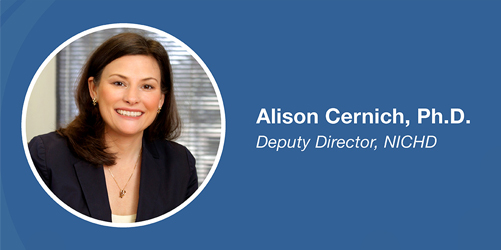 How did you become interested in science and research?
How did you become interested in science and research?
I loved science classes in elementary school and high school, especially when they included hands-on experiments. My uncle was a dentist and for a while, that’s what I thought I would pursue. I decided to pursue psychology after watching Silence of the Lambs; I wanted to be Jodie Foster and track serial killers using behavioral techniques.
What brought you to NICHD?
I worked for the Department of Veterans Affairs (VA) and was detailed to the Department of Defense (DoD) to help integrate policies and programs for mental health and traumatic brain injury in the VA and DoD health systems. While I loved the work, I missed research and wanted an opportunity to re-engage with the scientific community. A colleague suggested I apply for the director of the National Center for Medical Rehabilitation Research (NCMRR), and it was a perfect fit for what I wanted to do.
What types of training, experiences, or traits are essential for success in your position?
As Deputy Director of NICHD now, the essential things are being open to new opportunities, listening to our staff and relying on their expertise and knowledge to make decisions, and remaining mindful of people’s work-life balance. As a leader in a big organization, I sometimes rely on my training in clinical psychology to navigate conflict, to help in planning and anticipating consequences of actions we take as an organization, and keeping health and safety front and center in all that we do. As a rehabilitation professional, I was always a team player working with others to optimize a person’s function, and I take that same collaborative spirit to my work with our divisions and with our colleagues across NIH, the federal government, and the scientific community.
What do you find most valuable about working at NICHD?
NICHD supports critical science for populations about whom I care deeply. As a woman, as a parent, and as an ally of people with disability, I see the benefit of our science every day. The people who work for NICHD are our biggest asset, and the passion they bring to their jobs is infectious. It’s an honor to be in a leadership role and try to use any skill I have to advance the work they do every day.
Can you explain your job to people who are not familiar with scientific positions outside of a laboratory or clinical setting?
My job is to represent the science the institute supports and ensure that we have the resources, facilities, and most importantly, the people we need for that science to be successful. I coordinate a lot with people and ask for data to support the decisions we make in terms of what we fund as an institute. I also work to make sure we have processes and plans in place so we are strategic about the science and programs we support. I also serve as a resource for our staff and an advocate for our science.
If you have advanced along your career within the institute, can you summarize your career steps and how you successfully navigated these changes?
Previously, I was the director of NCMRR, a unique center within the institute focused on bringing together rehabilitation research across NIH and our sister federal agencies.
As the institute moved forward on new work, such as becoming involved in the All of Us program and ensuring our populations were included, or generating our new strategic plan, I became more engaged in leadership at the institute level. Through those opportunities, I learned more about various aspects of NICHD, including the work of other scientific branches, the investigators and science in the intramural program, and the critical support that our administrative staff provide to keep the science moving.
I decided to apply for the Deputy Director position because there are so many promising programs and opportunities to advance the science, and I thought my previous leadership experiences might benefit the work of the institute. I also enjoyed working with the leadership team—their collegiality, transparency, and openness to new ideas was a draw.
It’s been a challenge at the beginning of my role as NICHD Deputy Director to learn the job and respond to the pandemic, but I’m proud of the way our team is responding to the scientific needs related to the pandemic, maintaining our core mission, and taking care of each other.
What advice can you offer to people who are at an earlier stage of their career?
People ask me how I planned to become the deputy director of an institute, and honestly, I’m not sure it is easy to plan this path. What got me here was staying open to opportunities, listening to my instincts when I thought it was time to try something new, checking in with trusted colleagues, and seeking guidance when I felt stuck.
My last piece of advice is to continue to challenge yourself and monitor when you are feeling comfortable. That feeling signals when you need to learn a new skill, seek out a new challenge, or take on a role that is a little beyond your reach to grow. Also, pay attention to taking care of yourself to stay in balance: eat well, exercise, get good sleep, and ensure you maintain your relationships with family and friends outside of work.
Return to Get to Know NICHD.
 BACK TO TOP
BACK TO TOP